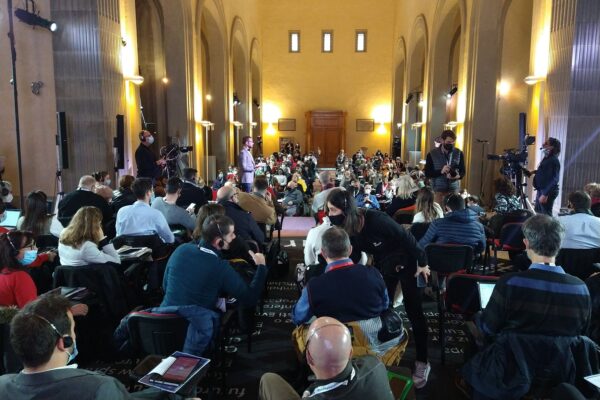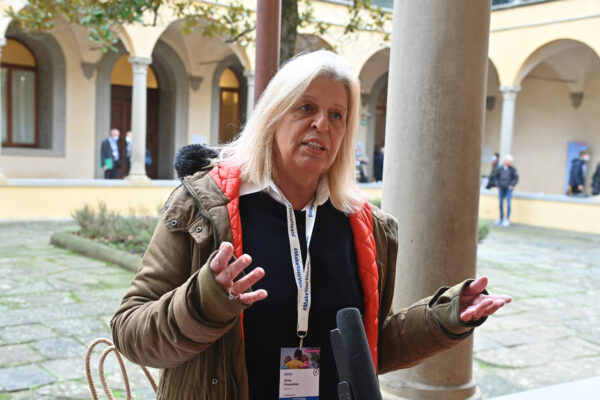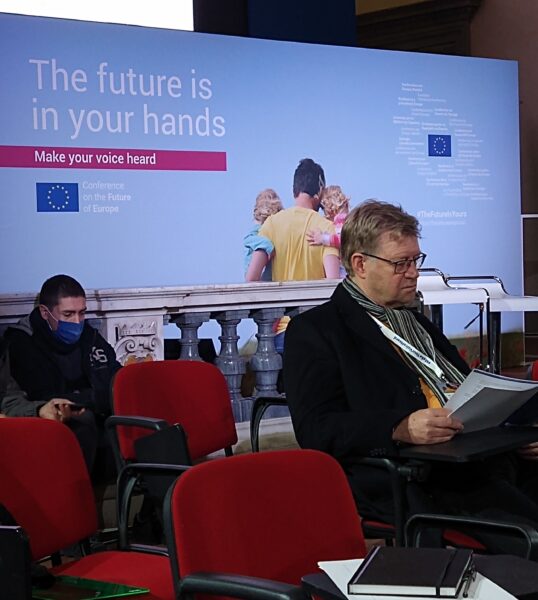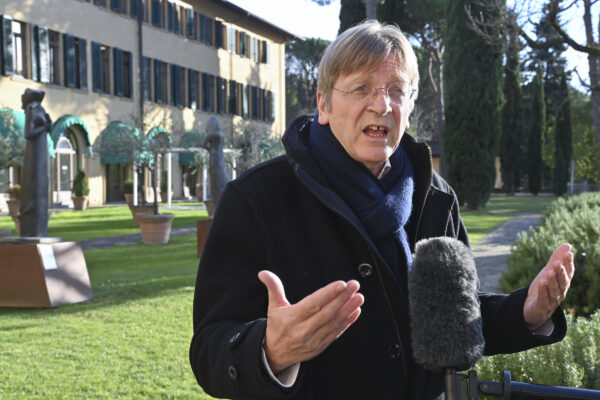Reopening the debate on a European Constitution, this time fed by the input (and vote) of citizens. “Freeing” the Continent’s agriculture from harmful emissions, pesticide use, and water waste. Forbidding by law the establishment of journalistic monopolies as well as collusion between media and politicians. Electing MEPs through transnational lists, together with a permanent forum of citizen observers within all EU’s decision-making processes. Including education on democracy (and Europe) in school curricula across the Union.
That’s not the wish list of an academic manifesto, but only a small part of the 39 recommendations that were voted last weekend in Florence. 200 citizens, representative of the continent’s population (at least on paper), were gathered to draft their proposals for the renewal of the European Union to be sent to decision makers. So far, they are vowing to “discuss” all recommendations – also because the process of citizen consultation known as the Conference on the Future of Europe that is now coming to life was planned and launched, with varying degrees of enthusiasm, precisely by EU institutions.
Democratic Conclave
What would those politicians and pundits ready to squabble about the theft ofindetity and traditions about the EU’s advice to employees about using “Happy Holidays” over “Merry Christmas”, if they knew that the most futuristic, and cumbersome, experiment of civic engagement ever attempted in the EU’s history was “celebrated” in a church; albeit transformed into a secular agora for the occasion? It is in fact in the Badia Fiesolana, a 15th century complex once frequented by monks, scholars, and pilgrims, and today part of the European University Institute, that the 200 randomly selected citizens gathered to discuss European democracy, rights, and values and to draw up their proposals for reform.
The forum is offered by the ambitious, though little known, Conference on the Future of Europe, an initiative first proposed three years ago by French President Emmanuel Macron and officially launched by the European Union, after long delays, last May. The objective of the exercise is to bridge the sometimes abysmal distance, primarily of awareness, between the work in Brussels and the daily life of a few hundred million EU citizens. The system to accomplish a project of this scale, as well as the waves of contagion, is anything but simple.
Who, What, How?

The civic working group that met from the 10th to the 12th of December on the rolling hills surrounding Florence is only one of four of the Conferenc Panels. The other three concern socio-economic issues, the environment and health, and foreign policy and migration. But due to the epidemiological situation in Ireland (the first group should have met in Dublin earlier this month), the second group, dedicated to “European Democracy/Values and rights, rule of law, security” was the first to conclude its dense work. The group first met in Strasbourg in September in a preliminary meeting aimed at learning the “rules of the game” as well as identifying the main political questions to be tackled. In their second meeting, held virtually in mid-November, the citizens gave shape to a long list of basic “guidelines” – over 200 – to respond to the problems identified. In Florence it was therefore a question of sifting and transforming those vague ideas and solutions into clear and concrete recommendation for the European political class as well as public opinion.
Swedish students, Spanish engineers, unemployed Greeks, and Italian pensioners. Thanks to the collegial environment, to an uninformed passer-by the meeting in Fiesole would have seemed like a cross between a professional conference and an (ageless) Erasmus gathering. But who were the participants and how were they selected? As per a handbook of deliberative democratic processes, the Conference organizers clarify that the citizens were selected at random from all 27 Member States in such a way as to reflect European diversity – by socio-economic and geographic origin, education level, gender, and age. Always randomly, and therefore ignoring their background or professional specialization, the 800 selected were assigned to one of the four Panels, and within these, each to one of the working subgroups.
For three long days, therefore, the 200 “neo-experts” of democracy and European values entered conclave to clarify their ideas, select the most ambitious and necessary, and transform them into effective recommendations. A long, deliberative process, carried out largely in the working subgroups of about fifteen participants and in a final plenary setting. Faced with the diversity and randomness of the sample, it was all made possible by a double mediation. On the one hand that of an interpretation service of rare firepower, capable of simultaneously translating every communication delivered into any of the twenty-four languages spoken by the participants. On the other, that of the facilitators called in to coordinate the work of each subgroup, as well as the plenary.
After having taken an ax to much of the initial material, with an initial vote that served to pare over half of the initial 200 guidelines established online, the working groups discussed, developed, and polished 42 recommendations more or less ready for use by European decisions makers. According to the rules decided by the Conference Secretariat to try to further streamline the work, only those voted by at least 70% in the plenary would be adopted. As a result, only three proposals did not reach the necessary threshold, while the other 39 garnered a solid consensus.
(Ed. The present paragraph may be re-read with no sense of guilt, twice or more, to try and grasp the Conference functioning).
We the People

Of those thirty-nine recommendations that are about land on the desks of Euro-parliamentarians and officials, there is a palpable mix of ambition and confusion, of utopia and concreteness. But now that it is officially in black and white, the final document of the Conference on Rights and Democracy takes on the characteristics of an urgent call to institutions to EU institutions, including national governments of course, to open to citizen participation. That would refer to the constant reception of effective inputs in decision-making processes, first, through the request to hold EU-wide referendums on the most important issues, imbuing the European political machine with periodic citizen assemblies or with permanent “civic envoys” in the decision-making bodies, or the mentioned idea of reopening a broad debate on a possible European Constitution. But that call also conveys the desire to receive clearer and more reliable information on the function and activities of the Union – by including education on democracy and Europe in school curricula, by supporting the reporting of EU activities in the media, or by launching a dedicated, multi-lingual app.
Desperate at grasping the “mysteries” of the EU, 78% of the plenary even recommended to change the name of some EU institutions: let the Council i.e., the body that reunites the governments, be called simply (and federally) the “Senate of the European Union”, they suggest. The reason for the request? “Citizens cannot be expected to know how to distinguish between the Council of the European Union, the European Council, and the Council of Europe”. Perhaps a course in brand awareness would not be unwelcome (this is not written in the proposal).
In addition to the proposals for the modernization of Union machinery, and pending the outcome of the Panels on more concrete issues, the citizens of the “democratic” working group do not hesitate to put out another key message: a pressing request for concrete EU policies capable of combatting socio-economic inequalities and improving their daily life. A request that is as predictable as it is urgent, as the EU emerges from one of the worst recessions since WWII. “We recommend the EU to make [sic] public investments which lead to the creation of appropriate jobs and to the […] harmonization of quality of life across the EU, between Member States and within [them]”, states one of the most voted recommendations. It’s time to outlaw tax havens in the EU and tax large corporations to invest heavily in education, research, and development, echoes another. Vox populi.
Finally, in terms of rights, citizens vociferously demanded – to Macron’s joy – a Europe “that protects”. That protects from violations of the rule of law, in every case, not only when it damages the common budget. But also, from threats of the digital age: the loss of control or the manipulation of personal data, cyber-attacks, disinformation or “bad information” resulting from the concentration of the media’s power. A veritable work program for the guarantee of rights old and new. Only once common democratic values have been truly consolidated within its borders, will the EU be able to become an ambassador for the “democratic model” abroad, solemnly declares one of the adopted recommendations.
Whose voice?
Between tablets and folders, posters and stickers, a riot of languages and headphones, at the end this gargantuan exercise of deliberative democracy runs effectoveòy and gathers broad consensus. When called to share their final assessments most citizens are enthusiastic, tired but happy to have taken on the role, at least for a few months, of legislators called to confront each other and offer solutions to thorny public issues. Certain to bring home a unique experience and in many cases, new friendships.

Some doubts over the real relevance of the work, even among the selected citizens, spread nonetheless. “If I look around, I seem to see a lot of bourgeoisie: I really don’t think I have met, for example, farmers, or people with low educational qualifications”, argues one aged Italian woman, who spent her life teaching Greek and Latin. The theme of the real representativeness of the selected sample often recurs in the discussion between citizens, but also among the professionals involved. If all nationalities are undoubtedly represented, in proportion to demographics, it is hard to identify Europeans with a migration background. And as the fruits of the deliberation demonstrate, the impression is that a certain pro-European spirit prevails among the participants, no doubt facilitated by an impressive organization covering trips, meals and accomodation for all participants. “I am perplexed about the initial selection of the participants”, Niels, a 27-year-old engineer from Munich, tells me over coffee, “I have the impression that there is an overdose of pro-Europeans or at least of ‘neutrals’ on the subject, with respect to the European population. Those most negative on the EU simply wouldn’t come here”.
The “personnel selection” tale seems in fact to coincide among all the participants. A call from a specialized agency in early summer, asked them whether they were available to participate in a grassroots working group on the future of the EU; the more or less well-founded suspicion of a prank call; understanding the seriousness of the context and direction; the final acceptation of the offer. Why not, after all? But how many, especially among the most skeptical if not openly critical of the Union refused instead?
The other underlying perplexity, especially among the experts who closely observed the process – researchers and civic activists – concerns the quality and transparency of the deliberative process. Due to the linguistic and logistical complexity of the process, the mediating role of the facilitators was necessarily significant. But not everything under their purview, reflecting the choices of the Conference Secretariat (made up of the three main European institutions), convinces the observers. From an initial streamlining of the guidelines that sacrificed many of the issues that had attracted interest and proposals in earlier meetings, leaving several of the participants disappointed, to the cumbersome nature of debates, between long waits, complex rules and not always effective facilitation. “If James Fishkin were here, he would be horrified”, jokes one of the observers during a break, recalling the father of the theory of deliberative democracy.
What next?
A string of legitimate doubts which do not affect however the enthusiasm of those who see in the Conference’s first outcomes the much-awaited tool for relaunching a suffering European democracy. “This process shows that if citizens are given a voice, clearly federalist proposals emerge from their reflections, because Next Generation EU has made it clear that the solution to common problems comes from a more united Europe”, claims Antonio Argenziano, the president of the Young European Federalists who organized a public initiative in Florence to raise awareness among citizens. “It is now the responsibility of the institutions to follow up on these requests, also by modifying the Treaties”, he stresses.

What happens now? The fate of such painstakingly developed recommendations is what troubles both participants and observers. The Joint Declaration, launched by European institutions (after long disputes) in March 2020, states that the proposals received by all the Panels will be “discussed without a predetermined outcome” by the plenary assembly of the Conference, which will gather citizen representatives, members of the European as well as national Parliaments, representatives of the Commission and national governments. The institutions will then have to provide public feedback on the use made of the received proposals. An uncertain and slippery mandate; open to the interpretation that political leaders will want to impose on it.
Is there a risk that everything will be lost and that the Conference will just become a little more than a great piece of advertising? “We are ready to take the recommendations into account and integrate them into our legislative work”, Colin Scicluna, Commissioner Dubravka Šuica’s head of cabinet, tells ResetDOC. “Now that the Conference is getting serious, I think it will be difficult for the European institutions to ignore the fruit of all this work”, confirms Guy Verhofstadt, leader of the EU Liberal Democrats and chair of the Executive Committee of the Conference. “From the end of January, in the plenary, we will ensure that the recommendations are taken care of and transformed into concrete proposals for reforming the Union”, he clarifies.
Citizens, or at least a good portion of them, have breathed fresh air into a fragile European democracy. Now they hope that politics won’t restrict the airflow.
Follow us on Facebook, Twitter and LinkedIn to see and interact with our latest contents.
If you like our analyses, events, publications and dossiers, sign up for our newsletter (twice a month) and consider supporting our work.


